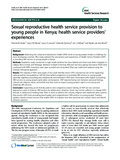| dc.contributor.author | Godia, Pamela M | |
| dc.contributor.author | Olenja, Joyce M | |
| dc.contributor.author | Lavussa, Joyce A | |
| dc.contributor.author | Quinney, Deborah | |
| dc.contributor.author | Hofman, Jan J | |
| dc.contributor.author | van den Broek, Nynke | |
| dc.date.accessioned | 2013-11-29T08:11:22Z | |
| dc.date.available | 2013-11-29T08:11:22Z | |
| dc.date.issued | 2013-11-14 | |
| dc.identifier.citation | BMC Health Services Research. 2013 Nov 14;13(1):476 | |
| dc.identifier.uri | http://dx.doi.org/10.1186/1472-6963-13-476 | |
| dc.identifier.uri | http://erepository.uonbi.ac.ke:8080/xmlui/handle/123456789/61093 | |
| dc.description.abstract | Abstract
Background
Addressing the sexual and reproductive health (SRH) needs of young people remains a challenge for most developing countries. This study explored the perceptions and experiences of Health Service Providers (HSP) in providing SRH services to young people in Kenya.
Methods
Qualitative study conducted in eight health facilities; five from Nairobi and three rural district hospitals in Laikipia, Meru Central, and Kirinyaga. Nineteen in-depth interviews (IDI) and two focus group discussions (FGD) were conducted with HSPs. Interviews were tape recorded and transcribed. Data was coded and analysed using the thematic framework approach.
Results
The majority of HSPs were aware of the youth friendly service (YFS) concept but not of the supporting national policies and guidelines. HSP felt they lacked competency in providing SRH services to young people especially regarding counselling and interpersonal communication. HSPs were conservative with regards to providing SRH services to young people particularly contraception. HSP reported being torn between personal feelings, cultural and religious values and beliefs and their wish to respect young people’s rights to accessing and obtaining SRH services.
Conclusion
Supporting youth friendly policies and competency based training of HSP are two common approaches used to improve SRH services for adolescents. However, these may not be sufficient to change HSPs’ attitude to adolescents seeking help. There is need to address the cultural, religious and traditional value systems that prevent HSPs from providing good quality and comprehensive SRH services to young people. Training updates should include sessions that enable HSPs to evaluate how their personal and cultural values and beliefs influence practice. | |
| dc.title | Sexual reproductive health service provision to young people in Kenya; health service providers¿ experiences | |
| dc.type | Journal Article | |
| dc.date.updated | 2013-11-29T08:11:25Z | |
| dc.description.version | Peer Reviewed | |
| dc.language.rfc3066 | en | |
| dc.rights.holder | Pamela M Godia et al.; licensee BioMed Central Ltd. | |


